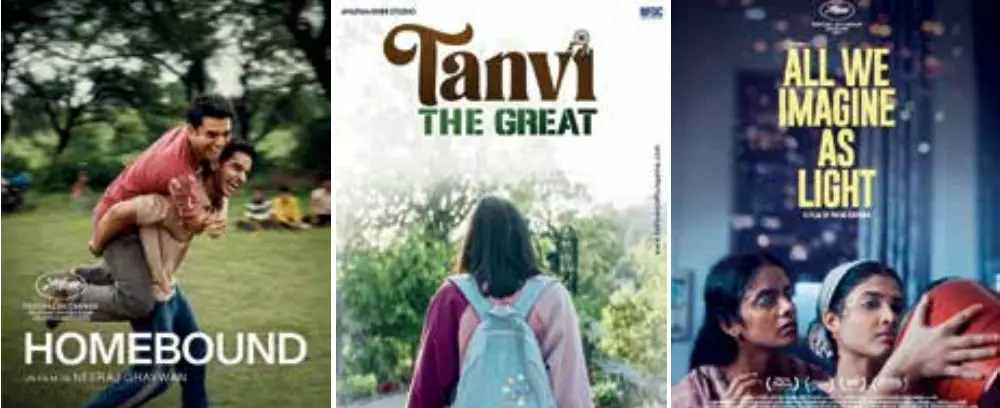India’s Moment at Cannes
As Cannes 2025 is all set to celebrate the best of global cinema, India, too, is making its presence felt as a powerful co-creator of cinematic brilliance

As the azure waters of the French Riviera prepare to reflect the flashing cameras and cinematic dreams of the 78th Cannes Film Festival (May 13-24, 2025), the festival’s official selection and jury reveal a lineup as compelling as it is transformative. This year’s curation, bursting with auteur signatures, daring narratives, and geopolitical subtext, reaffirms Cannes’ position as the global north star for storytelling in flux. But perhaps what’s most striking in this edition is India’s amplified presence, not merely as a participant, but as a co-author of cinema’s global conversation.
The official competition is a masterclass in balance; between legacy auteurs and new-voice renegades, between personal memory and historical magnitude. Wes Anderson returns with The Phoenician Scheme, a stylistic exploration of ancient mythologies meeting cold war intrigue. Ari Aster’s Eddington, already dubbed his most restrained yet haunting work, has set cinephile circles ablaze. Julia Ducournau’s Alpha explores post-human femininity in a world on the brink of biological redesign.
Also in the mix: Richard Linklater’s New Wave, a love letter to the late French New Wave era, filtered through Texan eyes. Kelly Reichardt’s The Mastermind subverts the true crime genre with startling quietude, while Iranian dissident filmmaker Jafar Panahi’s A Simple Accident is said to be his most autobiographical and subtly political work to date.
Out of competition, the buzz is electric around Spike Lee’s Highest 2 Lowest, a reimagining of Kurosawa’s High and Low transposed onto racialised corporate America. Add to that Christopher McQuarrie’s Mission: Impossible – The Final Reckoning—Tom Cruise’s swan song to the action franchise, and you have a festival equally attuned to intellectual density and box-office electricity.
This year’s juries read like a manifesto on cinema’s evolving conscience. The Main Competition is helmed by Juliette Binoche, the French icon whose career traverses the intimate and the incendiary. The Caméra d’Or (for first features) is led by Alice Rohrwacher, whose own filmmaking—half fable, half rebellion—symbolises the spirit Cannes now champions.
In the Critics’ Week jury sits Rodrigo Sorogoyen, British actor Daniel Kaluuya, and Indonesian producer Yulia Evina Bhara, a trio that captures three corners of cinematic ethos: the political, the performative, and the underrepresented.
If Cannes 2024 marked India’s return to the world stage with Payal Kapadia’s All We Imagine as Light, then 2025 is the year India steps fully into its power. Neeraj Ghaywan’s Homebound, featuring Janhvi Kapoor and Ishaan Khatter, is officially selected for the ‘Un Certain Regard’ section. It’s a poetic and piercing meditation on diaspora identity, trauma, and healing; far removed from the stylised excess of commercial Bollywood.
This matters. For long, Indian films at Cannes have either come from the indie gully; shoestring budgets and arthouse pedigree, or been entirely absent. Homebound changes that. It’s backed by Dharma Productions, the quintessential masala mothership. This signals a narrative shift: when large production houses start betting on small, soulful stories, it shows that storytelling, not just scale, is becoming bankable.
Another milestone is Anupam Kher’s directorial debut Tanvi the Great, premiering at the Marché du Film. Co-produced with NFDC and starring Game of Thrones’ Iain Glen, it merges Indian emotionality with international casting, a trend that’s here to stay. And making headlines beyond the screen is Alia Bhatt, poised for her Cannes debut, not as a brand ambassador, but as an ambassador of Indian cinematic evolution.
India’s Ministry of Information and Broadcasting, in collaboration with FICCI, has reimagined the Bharat Pavilion at Cannes 2025 as more than a diplomatic lounge. With participation from states like Jammu & Kashmir, Karnataka, Maharashtra, and Goa, the pavilion is a sandbox for pitching India as a production powerhouse. Film tourism, tax rebates, and one-window clearances are being spotlighted to attract global co-productions.
The Pavilion’s message is clear: India is not just a location; it is a collaborator. This aligns with learnings from WAVES 2025, India’s own M&E summit held in Mumbai earlier this year. Designed to mirror the ecosystemic scale of Cannes and Davos, WAVES emphasised global storytelling partnerships, soft power diplomacy, and the rise of regional narratives. Cannes, in turn, seems to have absorbed that energy, with an eye on India not as an outlier, but as a blueprint.
Cannes 2025 isn’t just an ode to cinema’s past; it is a negotiation with its future. With politically charged stories, genre defiance, and geopolitical undercurrents, the lineup reads less like a calendar and more like a reckoning. India’s role in this evolution is layered. It offers stories rooted in specificity (Homebound), seeks global collaboration (Tanvi the Great), and engages in cinematic diplomacy (Bharat Pavilion). More importantly, India is showing the world that great cinema doesn’t have to choose between cultural rootedness and international appeal. It can and must do both.
Cannes may be in France, but in 2025, the subcontinent casts a long, radiant shadow over its red carpets. India is no longer knocking at the gates of global cinema; it is designing a door of its own and inviting the world in.
The writer is a former Civil Servant who writes on Cinema and Strategic Communication. (With inputs from Zoya Ahmad and Vaishnavie Srinivasan). Views expressed are personal



